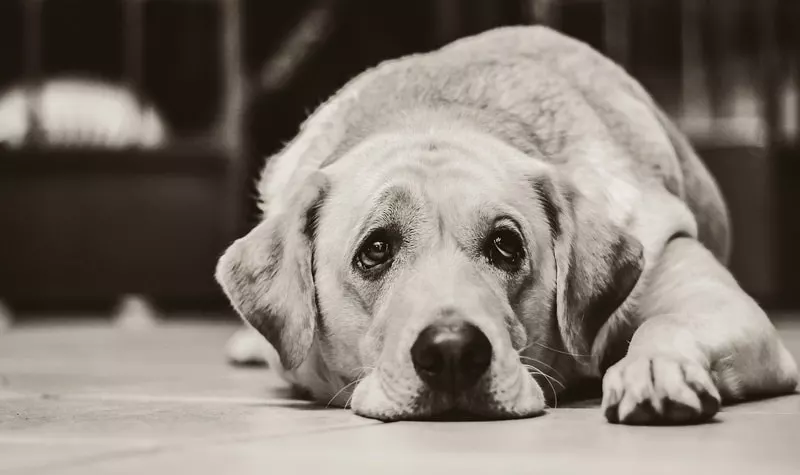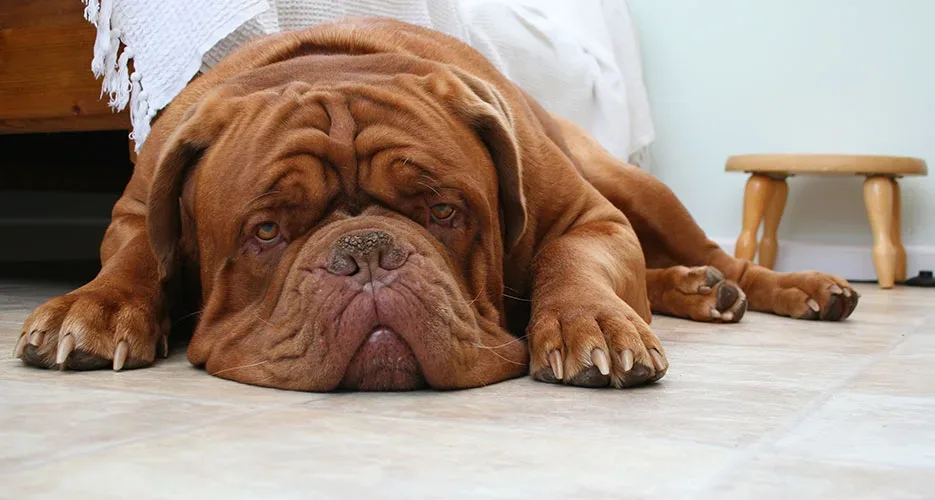Your Old Dog Not Eating and Sleeping a Lot? When you have an older dog, it can be worrying to see them eating and sleeping more. This could be a sign of an underlying health problem and it is important to look into the cause immediately. In this blog, we’ll take a look at some of the reasons why your older dog isn’t eating and sleeping, and what you can do to help them feel better.
Table of Contents
Reasons Why Old Dog Not Eating and Sleeping a Lot
It is natural for a dog to lose speed and strength as it ages. However, when an older dog starts eating and sleeping more than usual, it could be a sign of a health problem. If your older dog is sleeping and eating more than usual, it’s important to know why.
Here are 9 solid reasons why your older dog may be sleeping and eating more than usual.
Liver Disease
The liver plays a crucial role in digestion, metabolism, and detoxification. When a dog suffers from liver disease, these functions are compromised. The accumulation of toxins in the bloodstream can lead to nausea, loss of appetite, and lethargy. The dog may not feel like eating due to discomfort, and the body’s weakened state may lead to increased sleepiness.
Heart Disease
Heart disease can affect a dog’s circulatory system, leading to poor oxygen delivery to vital organs. This can result in fatigue and a reduced appetite. The lack of energy may cause the dog to sleep more than usual as the body tries to conserve energy. Additionally, fluid buildup (congestive heart failure) can cause respiratory distress, making it uncomfortable for the dog to eat or engage in normal activities.
Hypoglycemia
Hypoglycemia, or low blood sugar, can occur in older dogs, especially if they have diabetes or other metabolic disorders. When blood sugar levels drop too low, it can lead to weakness, lethargy, and a lack of interest in eating. Dogs may sleep more to conserve energy. Hypoglycemia requires prompt attention, and feeding a balanced diet at regular intervals is crucial to managing this condition.
Diabetes
Diabetes in dogs can lead to a range of symptoms, including excessive thirst, increased urination, weight loss, and lethargy. The inability of the body to properly regulate blood sugar levels means that the cells don’t get the energy they need, resulting in fatigue and a decreased appetite. Dogs with diabetes may also experience increased sleepiness as the body struggles to cope with the metabolic imbalance.
Age-Related Changes
It’s natural for older dogs to experience age-related changes, such as not eating and sleeping more. These changes can be frustrating and heartbreaking for pet owners, but it’s important to remember that they are normal. If your dog is not eating or sleeping more, it’s likely due to changes in their metabolism and energy levels.
As dogs get older, their metabolisms naturally slow down. This leads to a decrease in appetite and energy levels, which can make you sleep much more than usual. If your older dog is exhibiting these signs, it may be due to age-related changes and not an underlying medical problem.
Pain
Pain is a common cause of loss of appetite in older dogs. It can be caused by arthritis, dental problems or any other health condition that causes discomfort. If your dog is experiencing pain, it may be difficult for them to eat and sleep properly.
Medications
If you have an older dog who is not eating and sleeping a lot, it could be due to medications they are taking. Many common medications used in older dogs can cause side effects such as decreased appetite and excessive sleepiness. It’s important to talk to your veterinarian about any changes in your dog’s behavior. They may be able to adjust the dosage or switch to a different medication.
In addition, it’s important to make sure that your dog is not in pain. If they are, they may be reluctant to eat or sleep due to discomfort. Your veterinarian can examine your pet and prescribe pain medication if needed.
Also Read: Why Is My Dog’s Poop White? Things To Consider Before It Gets Serious
Finally, make sure that your dog is getting all the nutrition they need. You may need to supplement their diet with special foods or treats. If your dog is not eating enough, your veterinarian can provide you with advice on how to encourage them to eat more.
Stress
It is important to understand that as dogs get older, they can become more sensitive to stress and anxiety. This can lead to changes in their behaviors, such as decreased appetite and increased sleeping. In order to help your dog, it is important to identify the source of the stress and address it.
If your dog is feeling lonely, you may want to consider getting him a companion or taking him for extra walks. If the stress is related to a change in the environment, such as moving to a new home, you can make sure he has plenty of safe spaces and familiar objects that he can use for comfort.
Finally, it is important to talk to your veterinarian about any health problems that your dog may be experiencing, as these could be contributing to the stress. With some patience and understanding, it is possible to help your dog manage his stress and get back on the path to feeling better.
Nutrition
An older dog’s nutritional needs may differ from a younger dog. If your puppy is not getting the proper nutrients, this can lead to decreased appetite and increased sleepiness. If you suspect your senior pup’s nutrition is inadequate, talk to your vet about switching to a senior-specific diet.
Whatever the reason for your older dog’s lack of eating and sleeping, it’s important to monitor their health and talk to your vet if their appetite and lack of sleep continues. Be sure to give your puppy plenty of love and attention and keep them as comfortable as possible.
How long can a senior dog go without eating?

Senior dogs are typically considered to be seven years of age or older. While their dietary needs may differ from those of younger dogs, they still require regular meals and snacks.
Generally speaking, a senior dog can go up to two days without eating, although this can vary depending on the individual dog.
If your senior dog has not eaten in over two days, it is important to seek veterinary advice as soon as possible. Additionally, if you notice changes in your dog’s appetite, behavior, or weight, it is important to seek veterinary advice as these can be signs of an underlying medical issue.
How to get an old dog to eat?
Getting an old dog to eat can be a challenge, but it can be done. The first step is to make sure the food you are offering is nutritionally balanced and suited to your dog’s age and activity level. If the food you are offering is not palatable to your dog, you may want to try something else.
Try adding some wet food to the dry food, or adding some broth or warm water. You can also try offering treats like boiled chicken or pieces of cheese.
It’s also important to make sure your dog is comfortable when eating. Make sure the area you are feeding them in is quiet and peaceful, with no distractions. Serve the food in a bowl that is easy for your dog to access without having to stretch or strain.
Finally, make sure you are patient and don’t rush your dog when it comes to eating. Your dog may need some time to adjust to new foods or flavors, so give them time to get used to it. With a little patience and understanding, you can help your old dog enjoy mealtime again.
My old dog is not eating but drinking water, why?
If your old dog is not eating but drinking water, it could be a sign of several issues. It’s possible that your dog is not feeling well and is not interested in food. If this is the case, it’s important to take them to the vet as soon as possible.
It’s also possible that your dog is not getting the nutrients they need from their diet, and they may be drinking more water in an attempt to compensate. If this is the case, it may be worth switching to a high-quality food that is suitable for older dogs.
Finally, it’s possible that your dog is simply bored with their food and needs something new. If this is the case, you can try offering them different types of food or adding supplements to their diet.
Conclusion
In conclusion, there can be many reasons why an older dog may not be eating or sleeping as much as usual. From medical issues to depression, it’s important to take note of any changes in your pet’s behavior and to discuss them with your veterinarian.
Some of the most common reasons behind a lack of appetite and energy in older dogs include dental problems, digestive issues, pain, age-related illnesses, and stress. As pet owners, it is our responsibility to ensure that our furry friends are healthy and happy.
Taking care of an aging dog can be challenging, but with the right knowledge and care, we can ensure that they live their best lives.

